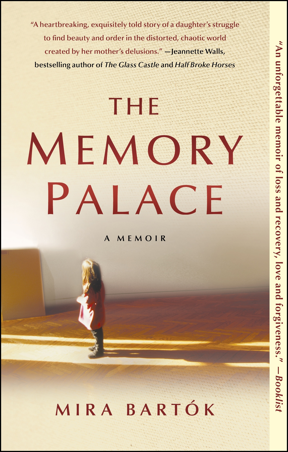
Arm Chair Critic
Patricia B. Bertschy Reviews:
The Memory Palace
A memoir by Mira Bartók
Pub. Free Press, a Division of Simon & Schuster, Inc., 2011
A fan of memoirs, I found The Memory Palace one of the most compelling I have read since Mary Karr's The Liars Club.
The Memory Palace is about a young woman's struggle to live with the decisions she makes about her schizophrenic mother. One of those decisions was to change her name so that her mother could not find her.
Bartók doesn't overload the reader with descriptions of her mother's behavior, but enough to make us feel the horror and sadness of it. Her mother was a promising pianist, slated for Carnegie Hall. Her first schizophrenic episode occurred when she was 19 years old and attending a music conservancy.
When Bartók and her sister were young girls of 11 and 12, on the train en route to piano lessons, their mother would shout for everyone to hear: "Are you menstruating yet? Who are you sleeping with? Do you know how to use a sanitary napkin?" When the girls try to walk away from her, pretending that she is not their mother, she shouts: "I am your mother. You can't run away from me! Is that sperm on your leg? Pull up your skirt and let me see."
She heard voices; she was sure that Nazis and the CIA had infiltrated their home. She tried to hurt herself, and she neglected her daughters.
When Bartók is grown and living on her own, her mother calls late at night to warn her that the straps of her backpack are dangerous, they could strangle her. Another night, she phones Mira 25 times to tell her that enemies keep setting her chair on fire. The next day, she appears in a tattered coat and uncombed hair at the art museum where Mira works. She tells her she has to come home. "Everywhere I look they have a gun pointed at my head," she says, and then asks to go to lunch.
In a particularly moving scene, Bartók is testifying in court about her mother's behavior. She wants the lawyers and judge to know that this was not her mother, that "she was a genius who could make music of infinite beauty." The core personality of a schizophrenic always remains, even if it is buried deep inside, Bartók explains.
Ultimately, Bartók and her sister change their names and distance themselves from their mother, but Bartók never really separates.
She thinks of her mother every day. Understandably, when she encounters a homeless woman who claims to be Renoir's daughter, she is reminded of her mother, but also when she is visiting a museum in Europe, shopping for a scarf or watching children in a park.
She is connected to her mother by a bond that transcends the illness. She remembers her taking them to classical concerts and art museums even though they would often leave early because of voices in her mother's head. And her mother squeezing Mira's hand and whispering, "You're my artist."
There are many tender moments like these, and they are the substance of Bartók's "Memory Palace," an imaginary place she builds to keep her memories safe.
The book is rich with literary and artistic references, and is punctuated with Bartók's drawings and her mother's journal entries. If there is a flaw, it is that the narrative is not always clear, but perhaps that is the book's appeal. There is no clarity about her mother's illness; she was diagnosed as disassociate, antisocial, manic-depressive, delusional, psychotic, paranoid-schizophrenic, hysterical. She was hospitalized, received shock treatment and discharged. But she always pleaded with her girls to return to her, calling them, writing to the post office box – the only address she had for them, "Why don't you come home, I need you here. Now be a good daughter and come home."

Available at:
www.Amazon.com
www.barnesandnoble.com
Patricia B. Bertschy is an avid reader who lives on Cape Cod.
Her nonfiction story "Discovery" won her a scholarship to the Cape Cod Writers Center Conference held at the Craigville Conference Center.
Patricia was named one of five finalists in the Norman Mailer Cape and Islands Community College Writing Awards for a work of non-fiction titled "The Long Walk".
Pat was also awarded third prize in PrimeTime Cape Cod magazine's 2010 Writing Contest for Poetry and Prose, for her short story, "The Dress."
Patricia welcomes your feedback and would be happy to receive readers' recommends for future book reviews. If you have a suggestion please email Katie@CapeWomenOnline.com
 |
